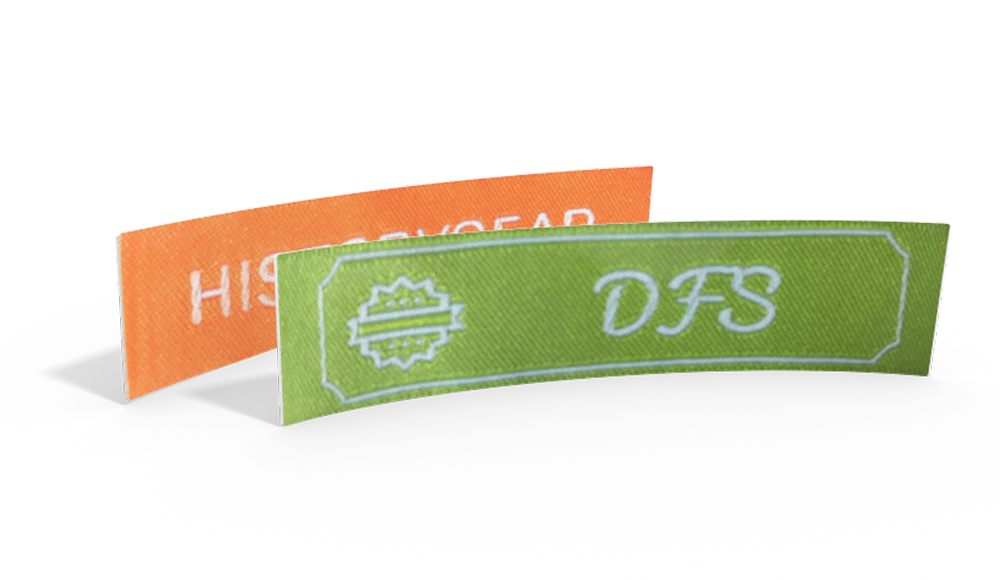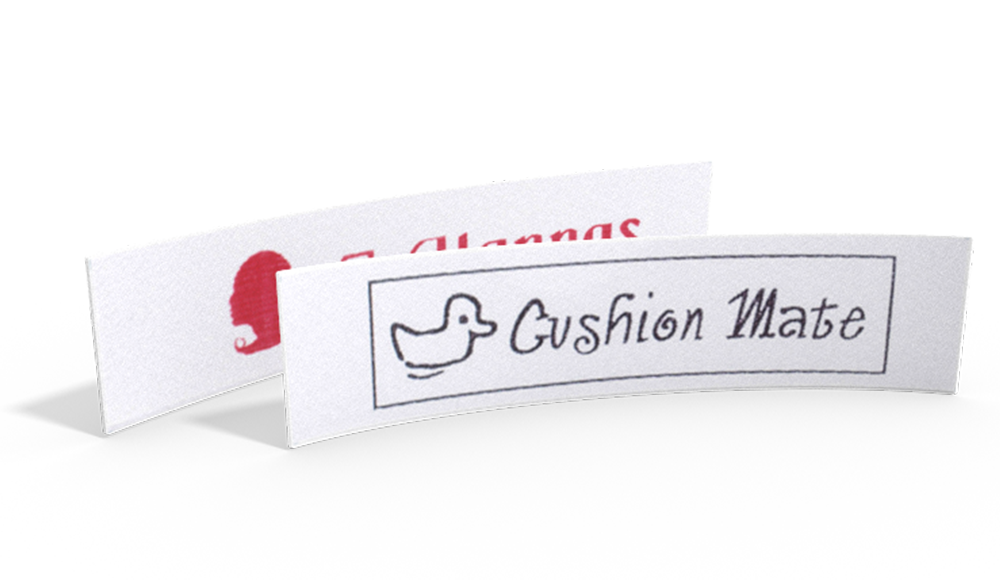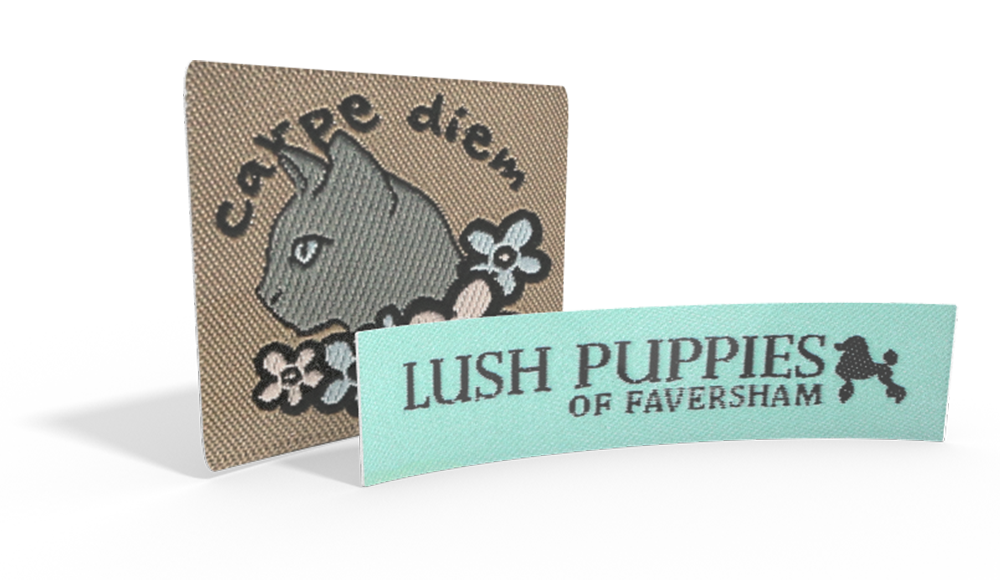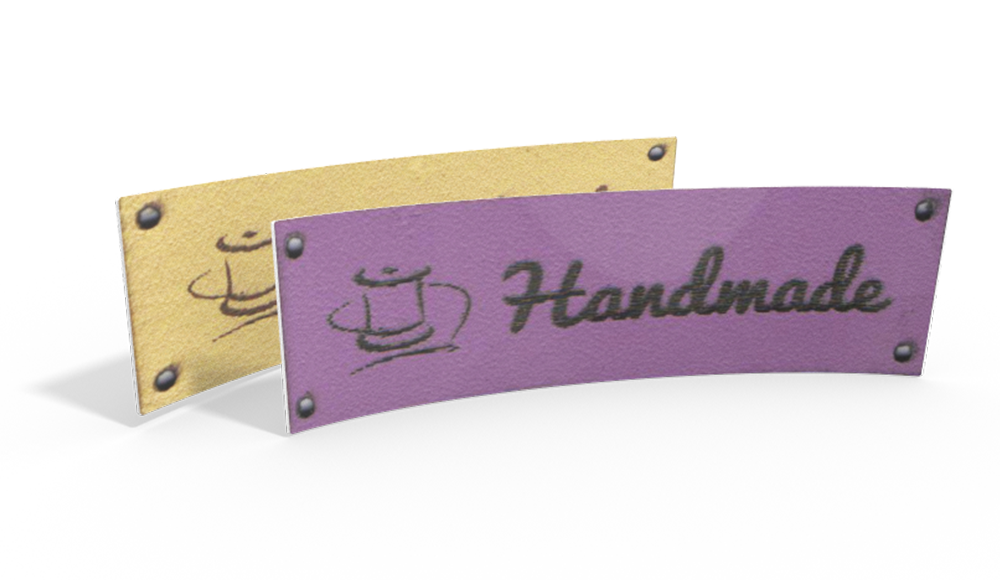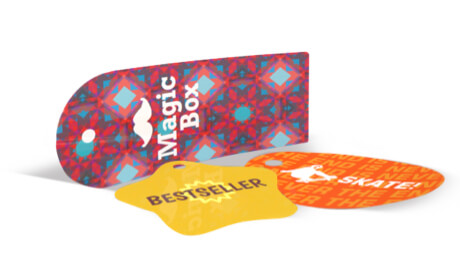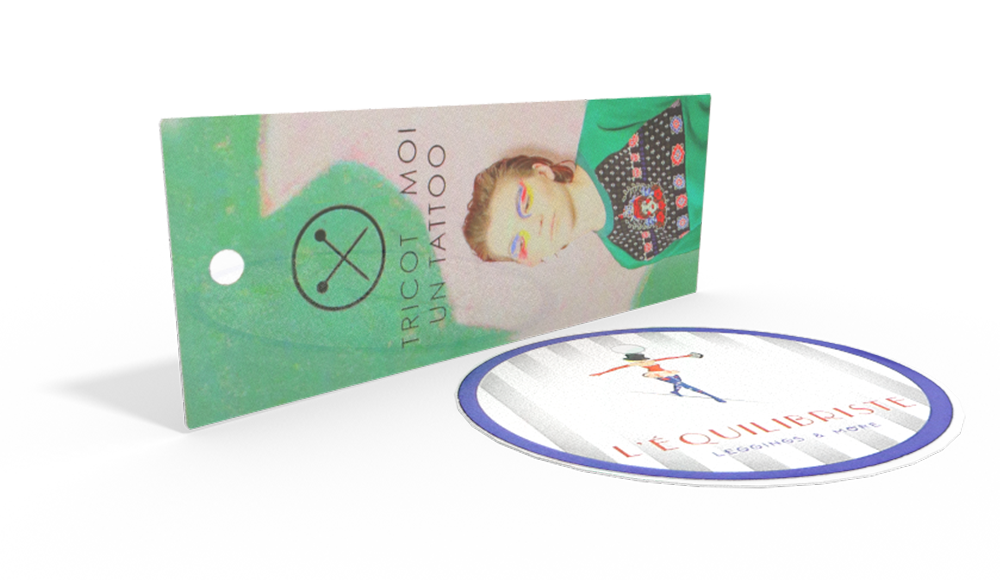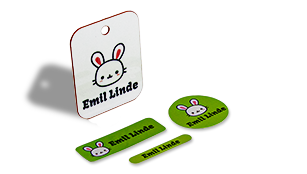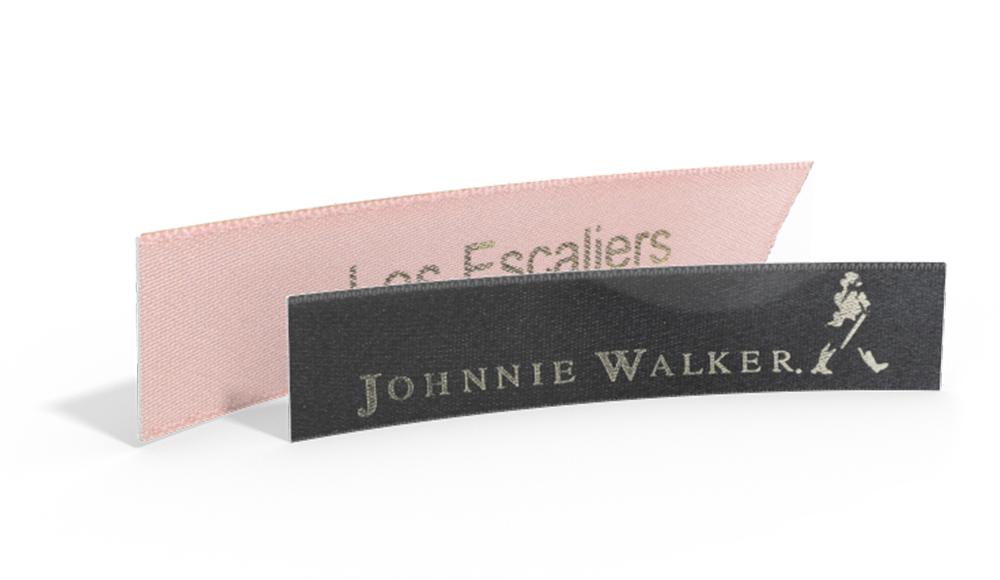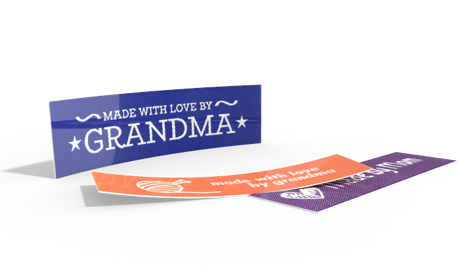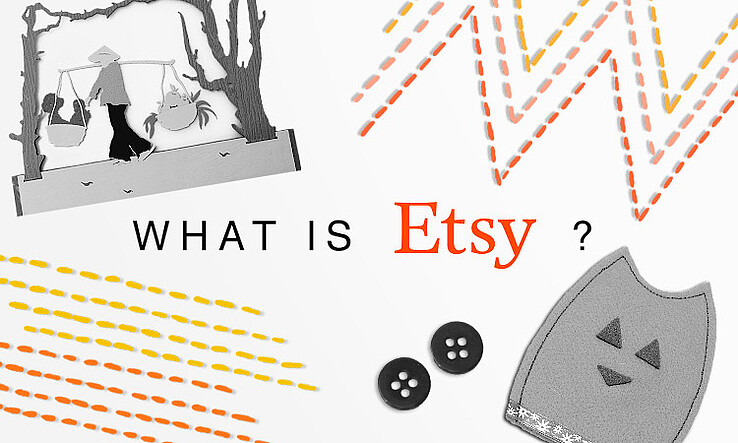First of all, let's clarify the question "What is Etsy?", what kind of online site it is and what exactly it has to offer. Etsy is the world's largest platform for selling and buying vintage items and handmade products. The number of active sellers on Etsy stands at around 2.7 million.
What Can You Sell on Etsy?
You can sell anything on Etsy that is handmade and not mass produced.
There is something for everyone on Etsy and it is the perfect platform for creative minds who love homemade and vintage items. Every single item stands out with its attention to detail. Sellers have the opportunity to add their own personal touch to their products, from homemade items like cards to jewellery. You can also find creative instructions in the Etsy shop that allow you to get creative yourself.
Personalized products are often used for special occasions. For example, you can have a gift ribbon lovingly designed and printed with your own artwork and text for a birthday or wedding. Self-made items can also be personalized with your own logo labels. Design custom labels to enhance your products even further. You can sell your personalized labels, hang tags and stickers on Etsy or buy them at Wunderlabel.
How Can Wunderlabel Support Sales on Etsy?
Wunderlabel is known for its customized and self-designed products. Our products range from custom labels to hang tags, stickers and much more. If you are considering selling your handmade items on Etsy, customized textile labels, hang tags and stickers can help boost sales of your products. Our online configurator allows you to easily design custom products to fit your needs and preferences. You can even add your own logo! Try it out right now!
The Etsy Success Story
The basic idea was originally quite simple and has stood the test of time: to offer everyone the opportunity to turn their creative ideas into a business. Etsy grew enormously thanks to this unique idea and reached millions of users within a short period of time. Especially in the USA, Etsy steadily grew in popularity. Etsy also established a base in Berlin in 2011. The company keeps growing and more and more people are inspired to join. Etsy is a special marketplace for creatives. Find out just why in the next blog post "5 Reasons to Choose Etsy".
Etsy: The Online Marketplace
If you've visited the Etsy website then you know that there are countless items on offer with multiple categories and a wide range of products. Etsy is just the place for anyone who loves homemade and personalized items. It is a marketplace for both buyers and sellers: Either you offer your own products for sale as a seller or you are interested in self-made, lovingly designed items as a buyer. Give your items a personal touch by attaching a self-designed hang tag and make a lasting good impression on your customers that will encourage them to order from you again and again.
How Much Does an Etsy Shop Cost?
Now you know that you can buy or sell handmade and unique products or gifts on Etsy. But you’ll want to know how much the Etsy shop you create will cost. There are fees, setup costs and taxes for the selling service. If you want to place ads to show your products in a prominent position, you will also have to pay for those. Below you will find a summary of the costs.
What Does Being an Etsy Seller Involve?
The operating principle behind Etsy is very simple, which is why the creation of an Etsy shop is also well suited for first-time users. To sell on Etsy, you need to create your own free online shop. Please make sure to learn more about how to register a small business beforehand. As soon as your Etsy shop is online, your products will be displayed on the platform and potential buyers will have the chance to take a closer look at the products in your shop.
You can display your pieces for four months for a small listing fee of 0.20 USD per item. A further transaction fee of 5% will only be charged if the item is actually sold. If you choose to use Etsy Payments, a further 4% of the sale price will be deducted. Etsy will automatically calculate and add the tax due according to each individual state tax law.
How Do I Operate as an Etsy Seller?
Small online shops don't usually get the attention they deserve. Etsy offers a marketplace where buyers can browse through these small online shops and find what they are looking for. The platform offers fitting products for almost every search query. Vintage items, individual jewellery and handmade works of art: It's all there! If you end up buying an item, the payment process is uncomplicated and secure. There are no additional costs for buyers other than the purchase price and all common payment methods are offered.
Conclusion
Etsy is one of the largest and most useful platforms for buying and selling homemade products.
Setting up an Etsy shop is straightforward and there are many useful options for displaying your products in the best way possible. However, you should have a clear idea of the upcoming costs / fees.
You can order personalized labels on Etsy or directly from the Wunderlabel online shop.
13 Things to Consider Before Starting Selling on Etsy
Etsy is essentially an online shopping mall where people just like you connect to produce, buy and sell mostly handcrafted, vintage, or one-of-a-kind items. According to Esty, they’ve helped 1.8 million sellers thrive by providing support and training for making their web-based stores successful. If you’re an artist, jewelry maker, interior designer, craftsperson or collector, Etsy is the perfect platform to showcase and sell your work to a global audience.
Got something to sell? Before you set up your free online Etsy shop, here’s 13 things you should consider:
- Decide What to Sell
You may have one product or several handcrafted items that have potential to be best sellers, but the key is to narrow down your product line and make it profitable. Browse the Etsy website and see what other vendors are selling and be sure to adhere to the site’s stringent policy on what you can and cannot sell. For instance, handmade items must be made exclusively by you and you should personalize them with your own logo labels. Sellers are prohibited from buying items in lots and passing them off as original one-of-a-kind items.
- Make It Well Made
Etsy shoppers are looking for one-of-a-kind items at an affordable price. They want a bargain but most will insist on quality goods that won’t fall apart or fall short of their expectations. As a shop owner, you want to carry unique items constructed or fabricated from top quality materials that rival merchandise that can be found in a retail brick-and-mortar store. Browse Etsy’s categories and look at what other vendors are offering and how much items are selling for. You will get an idea about what Etsy shoppers prefer and what they are willing to pay.
- Verify That It’s Vintage
Etsy has certain criteria for anything vintage: items have to be at least 20 years old. That means you can’t just empty out grandma’s closet and expect to get top dollar. The key to successfully selling vintage is the condition of the merchandise. Vintage collectibles like fine china, jewelry, home accessories or books should be in new or gently used condition without cracks, stains, dirt, or tears. Toys, notions, or clothing in the original packaging is extremely desirable for collectors. Customers will pay big bucks for vintage items in mint condition, so make sure to list items that are worthy of your customers’ time and money.
- Be Ready to Meet the Demand
Once you list an item or a line of products, you need to be able to meet what could be a high demand. Items are sold on a first-come, first-served basis; but you don’t want to earn a reputation for not being able to fill customer orders. Stock enough inventory to ship purchases within a reasonable amount of time and let customers know in advance if orders will take longer than 2 weeks to ship. As orders start coming in, can you keep up with them? Buyers expect orders to be filled within a certain time frame after paying for merchandise. But if you can’t get the orders out fast enough, you could gain a bad reputation as a vendor. Establish and post your delivery policy onsite so buyers will know what to expect.
- Define Your Buying Audience
You want to reach a certain demographic or target market that will want to spend money in your store. Moms with infants and toddlers will typically buy handmade baby items, like crib accessories and layettes that they cannot find at a commercial outlet. But custom designed and printed T-shirts, tanks, or ball caps might have a broader appeal more to adults ages 18-35. Establishing a web presence that speaks to a specific audience or potential buyer lends credibility and helps to establish your brand.
- Pick a Good Store Name
Your online store should tell potential buyers what you sell and reflect your brand. Do an online name search or surf existing Etsy vendors to make sure that your store name is not already being used. If you’re not sure about infringing on someone else’s brand, just add your first or last name to your store. Personalizing your store name makes your online enterprise uniquely yours without confusing the customer. Etsy offers a downloadable Seller's Handbook that offers tips and guidelines for selling most products online.
- Build a Seller Profile that Sells
Since potential customers don’t have a clue about you, give them an accurate but transparent image about who you are and what you have to sell in an online Etsy profile. You may want to include a quirky photo from your studio or a well-written narrative about how you first began crafting, sewing, making jewelry, or designing clothes. Your Etsy profile is essentially a calling card that can make a potential customer either want to buy from you or pass you by.
- Establish Policies and Stick to Them
As a trusted Etsy vendor, you need to enforce policies for returns and exchanges, payments, shipping and handling, and how you will communicate with buyers. Extending a hearty welcome to first-time buyers, sending out reminder emails for pending deliveries, thanking shoppers for their patronage, and replacing damaged goods are all issues that need to be determined before you make that first sale. Your online store should list all policies, which protects your business and builds trust with buyers.
- Count Up the Cost
While it costs nothing to set up shop on Etsy, you will incur three small selling fees to list your items, transact business and pay for processing. The fee to list an item is just 20 cents for a four-month posting or until your product sells. When you sell an item, Etsy charges a 3.5% transaction fee on top of your sale price. If your item sells for $5, you will pay a $1.75 transaction fee, plus shipping. You can choose to accept payments through PayPal or Etsy Payments. If you opt to collect money on Etsy Payments, they will assess 3% of your price, plus 25 cents for processing every sale. Since you’re selling to a global market, American vendors should let buyers know to pay in USD (U.S. dollars).
- Be Sure to Get Paid
As an Etsy vendor, one of your primary objectives is to get paid. Sure, you love making baubles and bows, but you have to watch your bottom line and the bottom line is making money. Fortunately, Etsy’s platform offers customers several secure payment options: PayPal, Google Wallet, Apple Pay, and Etsy Gift Cards and Etsy credit and debit cards. Be sure to include payment options on your store’s website so there’s no confusion about payment but plenty of reassurance buyers' information is safe and secure. Customer payments are deposited automatically into your designated bank account for withdrawal.
- Verify How You Want to Be Paid
Etsy has a great payment portal called Etsy Payments that safely and securely collects customer payments for vendors. Buyers can use their PayPal account, credit and debit cards, Google Wallet, Apple Pay, or Etsy Gift Cards. Etsy then deposits monies made from every sale directly into a designated bank account in your country's currency.
- Keep Good Records
While Esty should have a digital record of all of your transactions, you will also need to keep good records for tax filing purposes. Consult with your accountant or log onto go to irs.gov to see if your online store has to file certain taxes. It’s a good idea to set up your online business with a corporate structure and Employer Identification Number. The Internal Revenue Service offers free advice for individuals operating an online business.
- Get Ready, Get Set, Open Up!
Now that you've considered almost every aspect of opening up your online Etsy store, just follow these five easy steps:
a. Log onto Etsy.com and set up an account;
b. List your shop’s location and currency
c. Post your store name or logo. Surf the Etsy website to see what other vendor websites look like. Then, design a logo that distinguishes your store and one that is easy to remember. The first rule of successful branding is developing a graphic that accurately reflects your product or image. Check out what other Etsy vendors that sell similar products are using, but don't plagiarize.
d. Write a brief listing that best suits a specific category of merchandise. Categories include clothing and shoes, home and living, wedding and party, toys and entertainment, jewelry and accessories, art and collectibles, craft supplies and tools and vintage.
e. Designate how customers will pay for products.
f. Set up your method of paying Etsy fees. Fees can be deducted by electronic transfer from your checking account, debit or credit care, or PayPal account.
What is Etsy Plus?
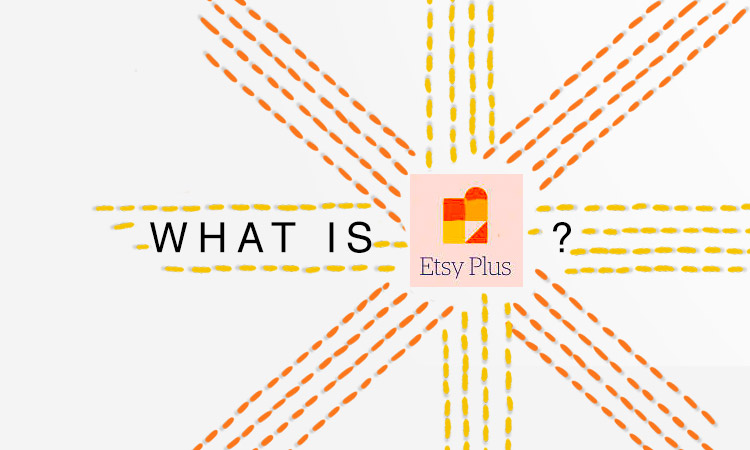
If you’ve looked at the Etsy website before then you have definitely come across the term “Etsy Plus”. Etsy Plus is a subscription package for Etsy members that differs from the Etsy Shop and offers a wider choice of tools, options and other benefits. The subscription costs $10 per month. Keep in mind that you do not need an Etsy Plus account to sell on Etsy.
Advantages of Etsy Plus
- Choose the design of your shop
Design your own shop symbol, create your own banners and let your creativity run free. There are numerous design options to make your shop unique.
- Highlight specific products
How you present your items is completely up to you! Showcase your products by choosing the layout and size, and adding animations to sell your goods faster!
- Free shop URL for the first year
The shop URL is included in the subscription for the first year.
- Etsy Plus credit
For the duration of your Etsy Plus subscription, you will receive two credits per month, which can be used to pay for any listing fees or EtsyAds: one credit for listing fees for 15 items, one credit of $5 for Etsy Ads.
Note: Unused credits will not be carried over to the next month and will expire if not used.
- Notifications for your customers
With Etsy Plus your customers will be notified as soon as you upload new items or when products become available again to make sure that they never miss out!
Etsy Plus offers a lot of advantages and is a great thing to have. But when you are first starting out the normal version is all you need. If you do become more confident with Etsy over time, it makes sense to switch to Etsy Plus and give the marketing of your handmade products a boost.
More about Etsy
To help you understand the difference between Etsy and Etsy Plus, we have prepared a short summary about Etsy below. We hope you find the information helpful!
Wunderlabel on Etsy
Etsy is the perfect platform not only for homemade clothing and other individual products, but also for the little finishing touches, such as labels that can be designed to your exact specifications. Our customized woven labels will give your handmade products a professional touch and make them stand out from the crowd. Wunderlabel's woven labels are 100% recycled and OEKO-TEX® Standard 100 certified.
Why wouldn't you want to add a personal touch to your self-made pieces? It's not just textile labels that can be personalized at Wunderlabel: All stickers and hang tags can be customized to elevate your brand and delight your customers.
What Fees Does Etsy Charge?
You will be charged the following fees for using Etsy's services: Listing fees, transaction fees and fees for using Etsy Payments.
Listing fees are $0.20 per item. Transaction fees are always 5% of the total item cost. If you choose to use Etsy Payments, you will be charged a flat fee and a percentage of the total price of the sale.
How Can You Sell Your Products on Etsy?
In order to sell on Etsy, you need to have your own Etsy shop, which you can easily create on the platform. After registering on Etsy, you can set up an Etsy shop and showcase your products. Click on "Create Etsy Shop" and you will be shown step by step what to do.
What payment methods are accepted on Etsy?
The payment process via Etsy Payments is very simple. All common payment options are available from various credit cards, PayPal, Google Pay, Apple Pay, bank transfers and more. Your customers will be able to pay in their local currency. All you need to do is set up a payment plan so that payments will be transferred to you at regular intervals.
Find out the top 5 reasons why you should choose Etsy.
5 Reasons to Choose Etsy

What Makes Etsy Different from Other E-commerce Platforms?
Etsy is a platform that allows you to sell and buy handmade products. You're probably wondering what makes Etsy so special when there are so many online shops that sell handmade products. Here are a few reasons why you should choose Etsy:
1. Etsy is eco-friendly
Etsy's focus is clearly on sustainability. Did you know that Etsy is committed to reducing CO2 emissions? It eliminates 100% of the CO2 emissions generated by shipping. Every time you buy an Etsy product, you are practically investing in an environmental project and offsetting the resulting emissions. And selling on Etsy means that you are supporting the environment too.
Tip: Embellish your packaging with a personalized sticker!
2. The Perfect Opportunity for Newcomers to Online Business!
Selling on Etsy is the perfect opportunity for small entrepreneurs who are just starting their own business. Establishing a company is much easier through the Etsy shop. Etsy is suitable for everyone, but especially for those wanting to take advantage of Etsy's reach to promote their products.
3. Etsy Means High Quality
With Etsy products quality comes before quantity! The shop is meant for truly individual products and mass-produced goods are not welcome on the platform.
This is exactly what sets the company apart - unique, special and lovingly crafted products. Wunderlabel also puts the emphasis on quality: add a customized hang tag to your unique items for a professional finish.
4. Ease of Use
Even first-time sellers will have no trouble understanding how Etsy works. The basics are straightforward and you will be supported throughout the process. Items can be put online in no time at all. Placing, organizing and managing your products couldn't be easier!
5. Benefit from Etsy's Global Reach
Etsy's wide scope allows you to reach potential customers all over the world. When it comes to handmade products, it is especially important to reach as many different customers as possible. The more visitors on Etsy, the more likely you are to sell faster. An international marketplace that is accessible to everyone offers more potential for a sale.
Opening an Etsy Shop: What You Need to Know
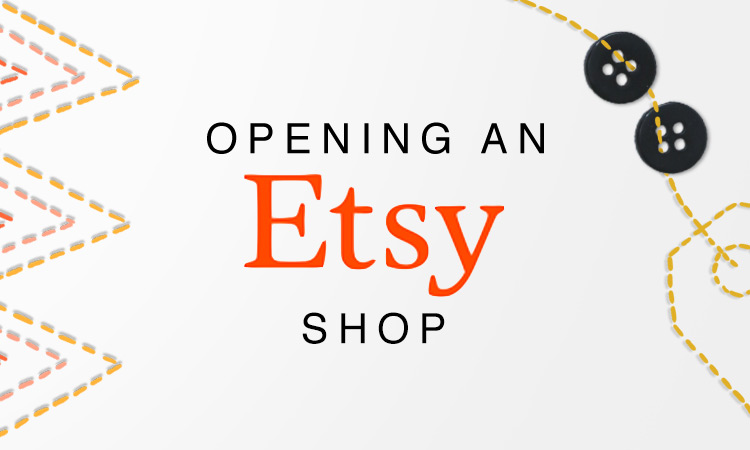
As with any other online shop, you need to follow certain guidelines when opening an Etsy Shop.This blog post explains in detail which requirements you have to fulfil in order to open an Etsy shop. Etsy is a marketplace for everyone who likes handmade goods. Both selling and buying is made very easy on this online platform. Etsy is becoming more and more popular because of the unique and homemade products on offer. Personalization plays a big role in this. Customizable products from Wunderlabel will add more value to your items and make them truly unique. If you want to start selling your handmade products then you should definitely open an Etsy shop. We have put together a few tips to help you get started. We hope that this blog post will help answer some of your questions.
What do I need to know before selling items on Etsy?
Creating a business and selling items on Etsy means that you will have to report your earnings and pay taxes on that income. There is also a high possibility that you will need to pay self-employment tax as well. Keep in mind that in some locations you will be responsible for collecting sales tax. You may also need a business license depending on your location and the types of items you sell.
Do I need a business license to sell on Etsy?
A quick search on Etsy will show that they do not require a business license to sell on their platform, but that doesn’t mean you don’t need one. Needing a business license or not depends on where you live. It also depends on what type of items you’re selling and how much you’re selling. A lot of states don’t require a business license unless your sales hit a certain threshold. It is best for you to check with the local authorities in your county or jurisdiction to confirm if you need a business license or not.
Do I have to pay federal and state taxes on my Etsy income?
Selling items on Etsy and making a profit means that you will need to claim this income on your federal and state income tax forms. Of course you are able to deduct business expenses from this income. A few examples of deductions that you can deduct from your business expenses are: marketing items, supplies for shipping and also office supplies like labels and toner cartridges.
Etsy will report your gross income to the Internal Revenue Service (IRS) on a 1099-K form. You will receive a copy of this form from Etsy. In the event that you don’t receive a copy, you still need to report your earnings on your tax return. If the particular state you live in has a state income tax, you’ll need to pay state income taxes on your Etsy income as well. Check with your official state website to obtain the correct forms and information regarding state income taxes.
What is a hobby business?
If the IRS considers your Etsy business to be a hobby business, you are not allowed to deduct business loss expenses from your income. To avoid being classified as a hobby business, treat your Etsy business like a serious business. Keep complete records of your sales and you must make a profit 3 out of 5 years that you are operating. Being considered a hobby business does not mean you do not have to pay federal or state income tax. It only means that you may not deduct your business expenses.
How can I calculate, charge and collect sales tax for my Etsy business?
Depending on where you live, you’ll need to calculate and collect state tax on your items sold. Most often it’s a percentage of the total of each of your sales. Sales tax laws vary greatly from state to state and county to county. It is best for you to contact local authorities to gather the specific information for your area. You can start on the IRS website for State Government Websites for Small Businesses and Self Employed.
Will I need to pay self-employment tax for my Etsy business?
Self-employment tax is a combination of Social Security and Medicare taxes. The self-employment tax which needs to be paid for your Etsy business is the percentage you would have normally paid as an employee plus the percentage which was paid by your employer. If your net income from Etsy is $400 or more, you will need to pay the self-employment tax. You can read more about self-employment tax on the IRS website.
After you have sorted out the legal and tax requirements, don’t forget to add a personal touch to your packages with a personalized sticker from Wunderlabel to make your product truly unforgettable!
Tips for a successful launch on Etsy
Before you start selling your products and opening your Etsy shop, think about how to best promote it to draw attention to your items. Your goal should always be to stand out with unique ideas. You can showcase your Etsy products perfectly with personalized Wunderlabel products. Why not add a personalized ribbon to your gift boxes?
Or use self-designed hang tags with a logo or even QR code to give a special touch to your products. There are numerous design options to be found in our shop with an interactive preview. Try them out in our online hang tag configurator!
If you sell clothing then our custom labels will get you noticed and impress potential customers.
Add personalized finishes to your products to increase sales and open your Etsy shop. Start selling today!
9 Tips for Branding Your Etsy Shop
"Your brand doesn't end with your Etsy shop and your products."
Branding is one of the most critical things you can do for a business—any business!—to help it be successful. It's easy to overlook branding for an Etsy store because, hey, isn't it just another shop on a site full of them? People are already coming to Etsy to shop. Why do you need your own separate branding?
In truth, it's exactly because of these reasons that your shop needs to be branded. You want to stand out from the thousands of other Etsy shops. You want to be memorable. You want your customers to think about shopping with your business, rather than just "shopping on Etsy." Here are a few ways to make your Etsy shop truly yours.
Understand Your Brand
If you've done any research on branding at all, you've probably come across plenty of marketers reminding you that a brand is more than a logo and a slogan. Unfortunately, the reason they all say this is because it bears repeating! Your brand is everything about your business, from what it's called to what you make to how you package your finished products. It includes your goals and your mission—the reason why you started the business in the first place—and the font you use on your business cards.
So yeah, branding can be a little overwhelming, but try to think of it as the big picture informing all the smaller elements. Start with the big points. Why did you start your business? What is most important to you as a business? Are you all about creating sustainable fashion? Are you creating one-of-a-kind knitted hats to express your creativity? What is it that makes this business uniquely yours?
From there, you can start making decisions about the smaller things, like what the business is called (yes, this is part of branding, too!) and what kinds of products make sense. Then down to even smaller details, like your logo, your slogans, the colors you use in your packaging, and so on.
Consider Your Customers
While your brand should be uniquely "you," it's also important to consider what will appeal to the customers you hope to attract. Think about the audience. If you're pitching quirky pet beds to self-described pet parents, you want to use language that will appeal to them (think "fur-baby" instead of "your pet"). Remember that the people you're hoping to use the products you create are not always the same as the people who will buy them. Children's products are a prime example. Infants are probably not surfing Etsy looking for adorable onesies to wear for their three month photos. You're marketing to moms, dads, and grandparents, so think about what they want in a onesie, too.
Avoid the trap of thinking your brand is for everyone. There's no one-size-fits-all when it comes to branding, and even though you may think you want to appeal to as many people as possible, it's far better to appeal to the right people—that is, the ones who want to buy from you, rather than all the people who will skim over your page and move on without making a purchase.
Create a Branding Guide
So how do you keep track of all these brand goals and signature colors and preferred Instagram filters? By creating a branding guide, of course! Your guide should include everything about your brand that you might want to reference later, or that you would want a new employee to know if they were to start working for your business. Even if you don't plan on ever hiring help, writing as if you're planning to give this document to someone who knows nothing about your business can come in handy since it tracks all the nuances of your thinking. Later, something that seemed completely obvious in the moment might not be so clear, unless you write out all the reasoning behind it.
A brand guide can also help you keep from going overboard with all your brand decisions. Even though it should be comprehensive, a brand guide should really be quite short. If your guide is starting to feel bloated and full of too many options, chances are you're getting away from the heart of your brand, and it's time to cut away the excess to make sure your true brand shines through.
Be Visually Consistent
Here's where we get into the nitty gritty practical tips. Sort of. The idea of being "visually consistent" is tricky, because it will mean something different to every shop. It's not just a matter of always using the same background in your photos (that gets boring quick!) or the same camera settings. It means that all your visual elements— your product pictures, your fonts, your brand colors—go together. They don't need to be monochromatic (unless that's your thing) or all formatted exactly the same way (again, unless that's your thing). They just need to be cohesive, and this is something that can take a lot of practice. Don't be afraid to try lots of different things and only use the best ones. Your brand will be stronger for it.
Use a Distinct "Voice" in Your Writing
You can say that your shop is the longest running family owned upcycled clothing boutique in the greater Indianapolis area. Or you can say that your business puts a modern twist on vintage finds. Or you can say that you're all about finding and creating the unique pieces that let your wardrobe match your personality. All of these could be talking about the same business, and they might all be true. But they each have their own voice, and, to stay consistent, a brand should have one particular voice. Think about who you are (both personally and as a business) and who you're talking to. Are you a mom talking to other moms? An expert talking to a student? A friend talking to a friend? Let this guide the tone you take in all your writing, from social media posts to product descriptions.
Don't Forget the Boring Stuff
Your policies, about page, and even product descriptions should be more than just a rote recitation of facts. For example, if you make graphic t-shirts that are funny and sassy, your product descriptions should be, too! Your return policy could include a caveat about not covering damage by marauding unicorns, unexpected Viking raids, or malicious cat vomit. Of course you need all the technical stuff in there, too, but these places are fantastic points to let your brand really shine. Don't miss the opportunity!
Brand Your Packaging
You don't need pricey printed labels and boxes for each of your items (though that's nice, if you can afford it). But packaging is an important part of how your products are presented, and it says something about your brand. It can be as simple as a hang-tag that includes your product details, or a handwritten note to the customer tucked into the box before shipping. Whatever you do, make sure you're consistent with your overall brand—remember, visual consistency! Use the right "voice!"
Choose the Right Product Mix
Don't fall into the trap of trying to cram your shop full of Etsy's trendiest items. Jewelry might be hot right now, but it doesn't make any sense in a shop filled with knitwear. Unless, of course, it does—meaning that maybe you offer tasseled bracelets made with the last bits of yarn from each skein so they don't go to waste.
Maybe that makes sense for your business, and maybe it doesn't. Each product in your lineup should tell part of the same story. If anything doesn't seem to fit, ask yourself why it's there. If it's your top seller, maybe the story you're trying to tell isn't the story your customers are hearing. This doesn't mean you need to ditch the item, or completely revamp your brand, but it does mean that it's time to have a serious think about what your brand means and what your message is across the board.
Keep the Brand Going Beyond the Shop
Your brand doesn't end with your Etsy shop and your products. The whole point of branding is to introduce your business to customers in a way that makes you memorable, likeable, and worth returning to. Think of it like a first date. You want to make a good impression so there's a second date. You don't want that second date to be exactly like the first. That's boring. In this metaphor, that "second date" would be a way for customers to engage with your brand outside of your Etsy shop. Think social media posts, follow up emails, a hashtag to follow printed on your packaging. Each time they engage with your business, they should recognize your brand, but there should always be something a little bit new and different, something to keep the conversation lively. With any luck, it will be a match made in heaven, and you'll have a customer for life.
Tips for Selling on Etsy
Image is everything when you're setting up shop to sell handmade goods online. Putting extra time and effort into the details can mean consistent sales and the difference between rock star reviews and so-so reviews.
Check out these tips to help get your Etsy shop successfully selling right off the bat.
BRANDING
Take some time and brand your shop. Choose a shop name and logo that is clever and memorable. On Etsy, this means creating a unique and eye-catching banner and avatar. Create a theme that is relevant to the feeling you want to portray with your shop. Etsy is filled with designers offering custom or semi-custom graphic kits if it's something you need help with. It would be a good idea to carry these designs over on to your business cards and maybe even your shipment packaging.

PHOTOGRAPHY
Great photographs are a must, so post the best photos that you can. Your aim should be to create clear and clutter free product photographs. Since your potential customers cannot see the merchandise in person, your pictures need to do the talking. Do this by starting with a neutral backdrop and, whenever possible, natural diffused light - a tripod wouldn't hurt either. You do not need to be a professional photographer or have professional equipment to take good photographs. There are loads of tutorials and tips online if you need help getting started.
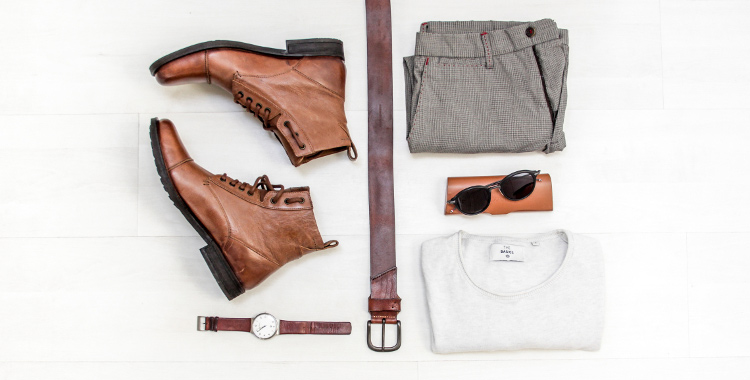
CONSISTENCY IS KEY
Slow and steady wins the race. It's better to consistently list items in your shop whether it be daily or weekly. By using this strategy, the newest listing are higher up in Etsy searches which is a way to build your shop presence. Using this method will keep your shop visible to potential customers.
PRICING
Having fair but competitive pricing is important when selling handmade goods online. Coming up with that price can be hard to do. Thankfully,
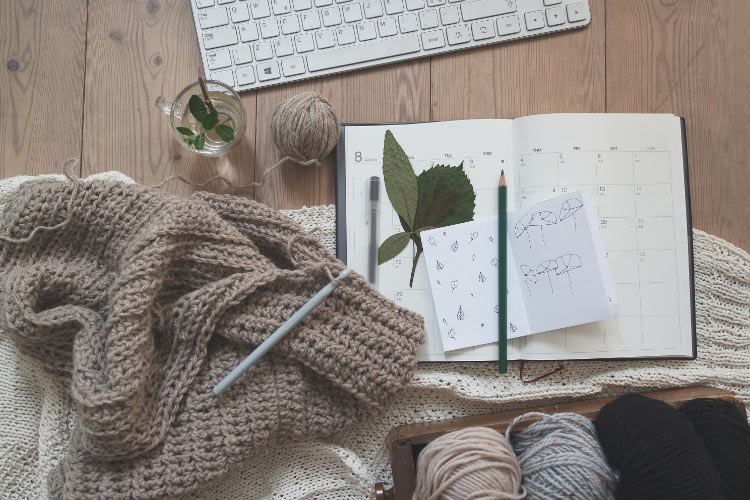
TITLES, DESCRIPTIONS AND TAGS
Start by giving your item a precise and descriptive title. Think about what words you would use to search for this item and use those words. A good rule of thumb for creating product descriptions is to describe the item as you would to a person who cannot see the item itself. Use some of the descriptive words from your title. How does it feel? Does it have a texture? What is the color, style, material, motif? Too much information is definitely better than not enough information when it comes to this very important section of your listing.
The subject of tagging can be intimidating, but it doesn't have to be. Creating a way for listed items to be easily searched and found is as simple as coming up with a group of relevant words. Filling out all of the 13 available tags on Etsy can be a cinch by pulling the keywords from your title and description.
JOIN THE ETSY COMMUNITY
Joining the online Etsy community can go a long way. Participate in forums by proving honest feedback and reach out to your favorite sellers for advice or help. Take advantage of the opportunity to join a few Etsy Teams. These groups of creatives can offer an unending stream of inspiration and support.

Be sure to check out our other Etsy blog posts: Etsy SEO in 7 Simple Steps and 4 Crafters Show How to Make Money on Etsy.
What tips do you have for selling on Etsy? Share with us in the comments – we would love to hear from you!
Etsy Selling: Five Benefits of Selling on Etsy
The very spirit of Etsy is that it’s an online community where crafters, artisans, and small businesses can sell without competing with the mass manufacturers in the consumer marketplace.
Have been toying with the idea of opening up an Etsy shop to sell your wares? Etsy is an online marketplace where crafters and artists can set up a shop to sell their unique goods. It’s also where shoppers go when they want to find handmade or creative pieces. The very spirit of Etsy is that it’s an online community where crafters, artisans, and small businesses can sell without competing with the mass manufacturers in the consumer marketplace.
Previously, the crafter’s only options were to lease out a corner of boutique or set up a booth at an art fair to try to make sales. While these are both fine avenues, Etsy has opened the floodgate by exposing sellers to a wide shopping audience, boasting a whopping 24 million active buyers. The site also fosters a closer buyer-seller relationship by encouraging open communication rather than purchasing from a large, faceless website.
There are many benefits to selling on Etsy. If you’re considering opening an online store, but haven’t yet made the leap, we’re here to help. Today we at Wunderlabel are looking at the top 5 reasons you should sell on Etsy.
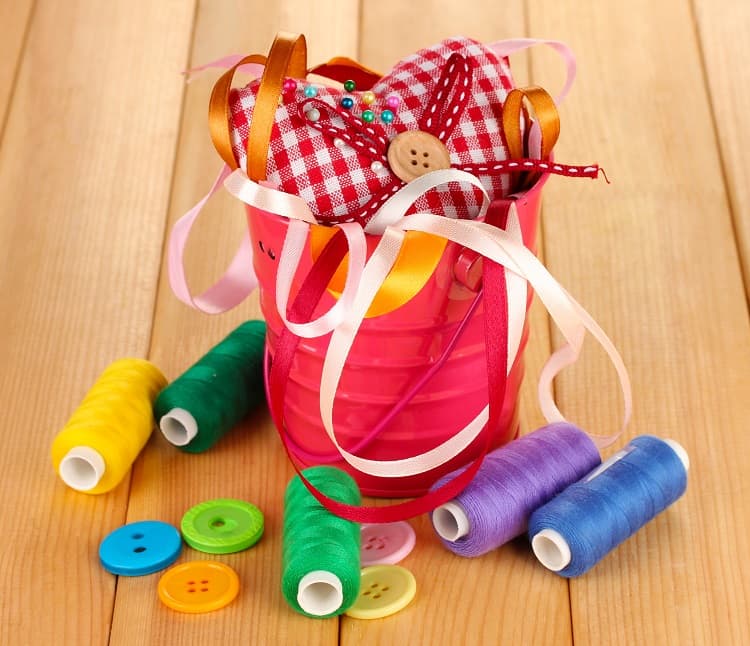
TO SELL YOUR GOODS!
Whether you enjoy drawing, screen printing, crocheting, turning books into things, making socks for dogs, making lamps out of non-lamp objects, or an endless variety of other crafts, now you can make items and actually sell them.To people! For money! Spin your enjoyable hobby into a profitable business by setting up on online store. Instead of trying to spread word through your friends, family and coworkers that you’re selling handmade scarves with cat ears, you can tell an entire audience of online shoppers. Which brings us to our next point…?
EXPOSURE
Instead of trying to forge a name for yourself on your own, you’ll be marching under the well-known banner of the Etsy name. Most people already know about Etsy, so it’s easy to direct them to your shop. Plus, Etsy utilizes Google ranking so you’ll have better search engine optimization (SEO). Meaning, if you open on online store, and someone tries to find it on the internet, it’s far more likely to pop up in a search as an Etsy store than if you have an independent website. Etsy also offers promotion opportunities for a small fee if you want to boost business and exposure.
EARN EXTRA INCOME
An Etsy store is a great way to make some side cash. Statistics show that the majority of the site’s shop owners have other sources of main income and an online shop on the side as a way to bring in some extra money. Chances are whatever you’re selling you enjoy making anyway, so you might as well earn some money crafting. The amount of time you devote to running your store will really affect the success of your shop, sort of a what you put in determines what you get out scenario. You can totally throw a few items online and wait for orders to trickle in. But one the of the benefits of Etsy is that here’s a huge network of users who offer endless tips, tricks and tutorials on how to grow your shop.
IT’S EASY TO USE
Etsy has made it unbelievably easy to set up an online store and get your business going, and they’re constantly making improvements that streamline the process. Beginning with setting up your shop and posting pictures of your items, to making a sale and shipping orders, there are tools every step of the way that make it a smooth experience. Customers can make payments right on the site without having to go through an external channel like Paypal. You can buy and print shipping labels right from the site that estimate shipping costs so you can avoid the line at the post office. Plus, it’s far easier than setting up your own website with a shop page, and it’s free to create. Etsy does take a small fee from each sale and transaction through their site, but it’s a pretty fair trade for the ease of use and exposure.
BETTER FOR SALES
You’ll get perks with Etsy that you may not have on your own. First of all, your shop comes with built-in statistics that you can use to track your customer’s experience. They’ll show you how many sales you’ve made and which items are most popular. Additionally, your stats will show you how many visitors you’ve had to your shop broken down by days and peak viewing times. You’ll also see how they found you and keywords they searched that led them to your shop. This information can be used to tailor which items you post and how you post them to steer sales. Etsy also allows you to offer discounts and coupons on your items to encourage repeat sales.
These are just a few of the benefits of selling on Etsy. There are tons of tips and tutorials out there that will show you ways to make your shop the best it can be. Best case, you get to sell your expertly handmade goods for some cold hard cash! Let the sales begin!
20 Sewing Crafts You Can Sell on Etsy
Looking to make a little extra money to support your crafting habit (or growing hand-made business) through an Etsy shop? Check out these ideas for one-of-a-kind items you can offer your soon-to-be customers!
- Headbands
An Etsy classic! Easy enough to make quickly, and with hundreds of different styles to choose from, headbands can offer your Etsy customers a lot of variety without a lot of time and effort on your part.
- Wallets
These are especially smart if you make masculine styles—who wouldn't love to find a great hand-made gift for all the guys in their lives? Since they can be assembled quickly and easily, consider offering customizable options, like adding a wrist-strap for women's wallets, or allowing customers to choose from a range of fabric prints.
- Clutch Purses
There's a whole range of petite bags you could offer, from beaded bridal handbags to studded leather rocker clutches. Find what suits your style and your sewing preferences, and offer a small number of different bags within that range to avoid spreading yourself too thin.
- Baby Clothes
With baby photo shoots becoming the norm and Pinterest-worthy outfits a must, more and more parents are turning to handmade artists and crafters to find those one-of-a-kind pieces. If you love kids, this might be the perfect option for you!
- Costumer
It can be tricky creating clothing for sale on Etsy; unless you're stitching to a standard range of sizes, each design would need to be custom created, which is the perfect option for a stitcher who loves to be creative! Keep in mind that these kinds of Etsy shops tend to have fewer sales, but each item sold is of much higher value than the average shop.
- Embroidered Art
Prefer hand sewing to busting out the machine? Why not stitch up some fun embroidered art? Tucked in a frame or left in the embroidery hoop, quirky, irreverent, and unique artworks made of thread are all the rage now!
- Pillows
Got an interior designer's eye? Help homeowners add a pop of color with bright, geometric patterned pillows, or bold florals. Or get cute and create squishy kids' pillows shaped like cuddly animal friends!
- Tote Bags
With more and more of us going green and ditching plastic, it's nice to have a range of sturdy (and cute!) totes on hand for lugging home the groceries. Plus they're also great for heading to the gym, dropping by the library, packing road trip snacks, and more! Offer a range of sizes to give your customers options.
- Laptop Cases
The perfect gift for a college-bound student. Offer chic and simple sleeves, bright monogrammed zipper cases, or both!
- Aprons
Aprons offer the fun and variety of clothing without all the hassle of getting the perfect fit. From ruffled confections that are almost too cute for the kitchen to kids' coveralls perfect for art projects, choose a style that suits your shop's vision and offer a few variations to keep things interesting.
- Stuffed Animals
Who didn't have a favorite teddy bear (or stuffed zebra, or shark, or what-have-you) as a kid? Recapture that whimsy and make fun animal friends to offer in your shop! Make sure to be mindful of any potential small parts or choking hazards and warn parents if any of your creations are meant to be admired rather than played with.
- Infinity Scarves
Ultra quick and easy to make, you can whip up an entire stock of scarves in an afternoon. Since they're so easy, though, you'll want to make sure your scarves stand out from the crowd. Consider looking for unusual fabrics, or combining fabrics in unexpected ways. If you're feeling ambitious, you could even print or paint your own fabrics!
- Backpacks
They're not just for students anymore! Trendy backpacks sporting leather trim and vintage-inspired fabrics are cropping up everywhere. Why not offer your own take with custom, hand-made flair?
- Upcycled Projects
Do you specialize in turning old sweaters into cozy mittens? How about crafting tea towels from vintage flour sacks, or pillowcases from old embroidered handkerchiefs? Etsy shoppers love upcycled projects, so don't be afraid to showcase what you've made with "before and after” shots!
- Makeup Organizers
From zippered pouches with dividers and pockets to roll-up brush organizers, it seems there's an entire world of sewing projects that cater just to the fashionista with a flair for makeup and a collection to keep organized.
- Pet Accessories
Adorable bow-ties for wedding-bound pups? Check. Cat beds shaped like open-mouthed sharks? Check. You can find all kinds of quirky, hand-sewn pet products on Etsy, so consider putting your own twist on these projects and pampering some pets!
- Should Bags
Whether it's classic messenger bags or zombie-print purses, quality shoulder bags are a hot commodity on Etsy. Consider creating a few signature designs to set your work apart from the rest.
- Kitchen Essentials
Embroidered tea towels? Quilted placemats? Elegant linen napkins? Festive table runners? The list of projects for the kitchen and dining room goes on and on. Offer a range in your Etsy shop and remind your customers that you offer complete matched sets!
- Quilts
Quilting is a labor of love, and often bedspread-sized quilts are too time and labor-intensive to be viable for a handmade business. Lap quilts, baby quilts, and other smaller items, however are perfect for Etsy.
- Holiday Decor
While the Christmas season offers plenty of ideas—stockings and tree skirts, advent calendars and table runners—holiday-themed decor items can be a hit throughout the years as long as you change up what's on offer. Keep in mind that you'll need to be crafting ahead of the season, so you might find yourself stitching Christmas stockings in July!
What to Sell on Etsy
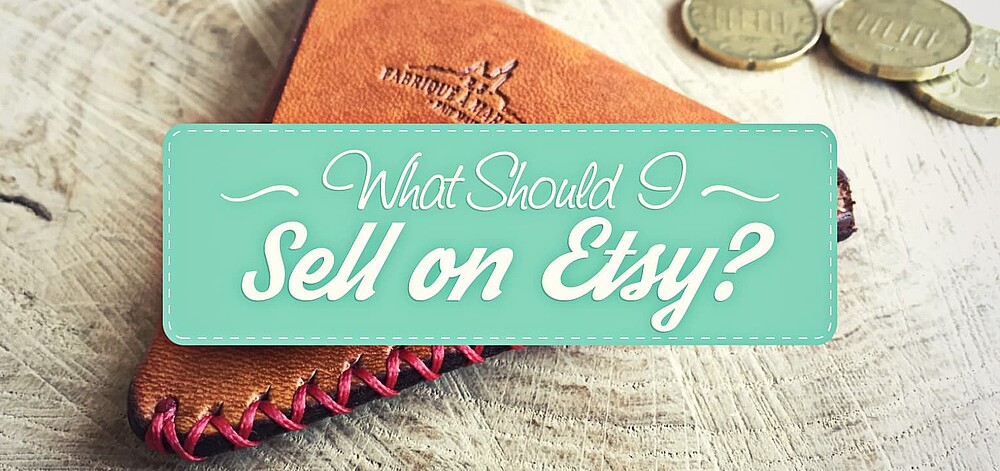
Etsy is one of the top internet marketplaces in the United States and has a consumer group that reaches worldwide.
The site allows small businesses, crafters and artists to set up an online store and sell their goods to a built-in customer base. Unlike large online stores, it fosters a personal shop owner/customer experience with small, independently-owned shops.
Opening an Etsy shop happens one of two ways:
1. You have a hobby/craft/stockpile of handmade goods and need to know how to sell them.
2. You want to take part in the online marketplace, but aren’t exactly sure what to sell.
If you’ve been thinking of opening an Etsy shop, you’re not alone. The site currently boasts 1.6 million sellers, some with more than one shop. But now that you’ve decided to open a shop, how do you know what to sell? Luckily, we’re here to help you. Today we’ll help you determine what you should sell on Etsy so you can start stocking your online shelves.
Do Your Thing
The most common reason people start an Etsy shop is because they enjoy making a certain thing and decide to sell it. Do you crochet, sew, paint, screen print, wood work, etc. in your spare time? Is the thing you enjoy making something that could be sold and enjoyed by others? That’s what you should sell. There’s a good chance that you’ve already got a supply of items to start with and you can just continue adding to your stock once your store is open. Plus, if it’s something you like making anyway, it will feel like you’re getting paid to do your hobby instead of work.
Chances are, if you’re passionate about creating something, it will show. Your craftsmanship will be good, you’ll enjoy coming up with new designs or ideas for items to sell, and you’ll derive joy from the fact that someone else out there enjoys it too. And that they’ll pay money for it! There’s nothing like the first time a stranger buys something you’ve lovingly made. It’s part of the small business, crafter-to-customer spirit of Etsy.
Fill a Gap
Have you ever searched for an item on Etsy or online and weren’t able to find exactly what you’re looking for? It’s likely that if you’ve searched for it, someone else has too, and that means there’s a demand that is not being fulfilled. You could be the supplier!
Even if you’re not a crafter, you could operate on the designing end and work closely with someone who can make your idea a reality. Do you want a shirts with quotes from your favorite movie? Commission a graphic designer and make your own shirts. Or, use this as an opportunity to learn a new skill and start creating your own pieces.
Find a Niche
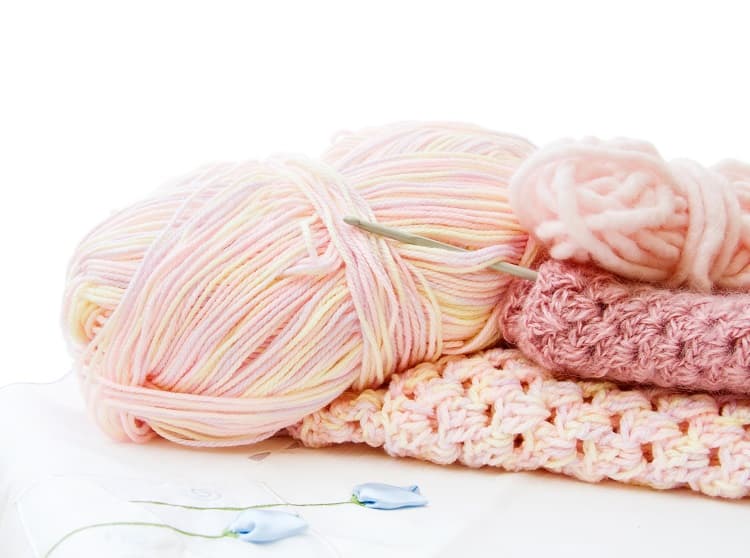
If you already have a skill, but don’t want to be yet one more shop on Etsy competing with others selling the same item, refine it down to a niche market. Take an idea and specialize in a particular area.
Let’s say you make hair bows for girls, but you don’t want to get lost in the sea of hundreds of shops that already do that. Find a specialty that makes you stand out. Make bows for holidays, or with custom initials, or that are only superhero themed. When you take a broad idea and narrow it down to a specific area, you’ll appeal to a certain audience that searches out your particular item. And, rather than being one of many shops doing the same thing, you’ll be “that one shop that makes leather wallets emblazoned with sport team emblems that would be the perfect gift for Father’s Day/your brother’s birthday/your anniversary.”
This approach also allows you to share your passion with like-minded people, which is really what Etsy is all about. Thought you were the only one who would like a throw pillow made from a vintage Smiths t shirt? You’re not alone.
Search Top Sellers
If you want to jump in with both feet and try your hand at succeeding in a competitive marketplace, this approach is for you. Researching the top-selling items will give you an idea of what’s doing well and what’s in high demand. You may find something and think, “I could do that differently, or reach a different audience.” Or, apply the aforementioned ideas of paring it down to a particular niche or adjusting an idea to fill a need that is not being met.
Searching out successful shops is also a great opportunity to learn about what works and why those sellers are advancing. What tips would they have to share? How did they begin, and how were they able to grow their shops? The Etsy community is a really supportive one and there is an unending library of blogs, articles and comment threads of people sharing ideas about how to grow and have a flourishing store.
No matter what you choose to sell, it’s worth taking a chance and opening an Etsy shop. If you really like making and/or selling an item, your customers will recognize your passion and the work that you put into your products. Share your gifts with the world!
What are some tips you’ve learned about selling on Etsy? You'll definitely need you own woven labels and hang tags for your shop!
Alternatives to Etsy
As a creative person you are likely to want to share your handmade items with others. Fortunately, selling your goods online has become much easier: Simply choose the right marketplace for your products, take high-quality photos, give your items a professional finish with personalized labels or hangtags and you're ready to go!
If you are familiar with our blog, then you know that we think Etsy is an excellent platform for selling handmade goods. But it's not the only online marketplace out there and there are some interesting alternatives to Etsy that are worth looking at.
Why Look at Alternatives?
Etsy is a large international platform that allows you to reach millions of customers around the world. The popularity of Etsy offers a lot of potential, but also means that there may be too much competition from other sellers.
Price-wise, Etsy is very attractive and offers many useful tools and add-ons for marketing and selling your unique items. You need to consider whether the total cost is worth it for you and fits into your budget: Comparing what other sites offer before making a decision definitely makes sense.
Another important point to keep in mind is that each marketplace has different rules. Etsy's policies are fairly straightforward, but may not be tailored to your specific needs.
We want to help you find the right platform! In this article we'll introduce you to alternatives to Etsy that are worth considering.
Amazon Handmade
You've heard of Amazon, right? But you might not have heard of its online platform for handmade products: Amazon Handmade.
Not everyone can sell their products here. You have to apply to become a seller and prove that the items are handmade by you or a small group (e.g. family members or employees). As with Etsy, mass production is not welcome! And digital products, electronics and food are not allowed to be sold on Amazon Handmade either.
Products: Handmade products, also prefabricated items with own design or upcycled used items
Potential Customers: Large global reach (about 197 million).
Price: Referral fee of 12%; No fees for joining, creating a shop and listing your products
Number of Articles: Unlimited
Customization: Good degree of customization; Detailed product descriptions can be added
Effort: Substantial when setting up, very detailed information required to increase visibility
Pros: - Global reach
- Large user base
Cons: - Sale of digital products, electronics and food prohibited
- Limited analytical tools
- Low customer retention (minimal contact with customers)
Zazzle
Zazzle is the perfect place for graphic designers, photographers and artists. Customers use your artwork to personalize items in the shop, such as mugs, cards and accessories. It couldn't be easier: you upload your designs and Zazzle takes care of the printing, shipping and customer service.
Products: Wide range of customizable products
Potential Customers: 30 million
Price: Seller receives approx. 15% of the selling price
Number of Items: Unlimited
Customer Retention: Minimal contact with customers
Effort: Minimal, just create and upload your designs
Pros: - Zazzle does most of the work
Cons: - No possibility of offering your own products
- Only suitable for designs / artwork
Storenvy
Storenvy is a lesser-known platform that specializes in artwork, crafts and homewares. You can set up an attractive shop within 5 minutes - even without any technical know-how. Storenvy provides you with tools to manage and market your shop and also offers additional apps and integrations.
Products: Artwork, crafts and homewares
Potential Customers: 1 million
Price: 15% commission
Number of Items: Up to 20 - up to 5000, depending on what plan you choose
Customisation: Storefront can be customised with HTML and CSS
Effort: Moderate, customization is required
Pros: - Customizable storefront
- Analytical tools
- Discount codes and other marketing tools
- Can be linked to own domain
Cons: - Customization requires more effort
- Limited customer support
Productswithlove
This aspiring online marketplace, founded in 2018, is aimed at sellers of DIY items from the European Union and Switzerland. However, the platform is also intended as a meeting place for creative people, both buyers and sellers. Whether in the blog, the forum or the Facebook group, like-minded people can exchange ideas and find inspiration here.
Products: Handmade products from the EU and Switzerland
Potential Customers: 2000
Price: 3% sales commission, no listing fee, $24 - $74 per year (depending on the plan you choose)
Number of Items: Unlimited
Pros: - Support from seasoned sellers, programmers and lawyers
- Individual items or the entire shop can be highlighted (for a fee)
- Help with importing products from Etsy
Cons: - Small target audience
Fairmondo
If you're passionate about sustainability, you've come to the right place. This is a cooperative that wants to offer a fair alternative to conventional online trade. Fairmondo promotes fair, sustainable products and supports organisations that fight corruption. Products can also be exchanged, lent and given away here. The marketplace is open to individuals and commercial traders alike.
Products: Fair Trade, eco-friendly and homemade
Potential Customers: A few thousand
Price: -No listing and selling fees for individuals
-7% sales commission (maximum $34) and 4% for fair products (maximum $17) for commercial sellers
Pros: - Fair and environmentally conscious
- Automatic donation to an initiative against corruption (1% of each transaction)
- Products from small producers and used rarities
Cons: - Very few potential customers
Shopify
Maybe your dream is to have your own online shop instead of selling your goods through a marketplace. With this cloud-based shop system, you can make that dream come true! Simply put, Shopify is a modular system for creating online shops. The system includes all the tools you need to sell your products and is easy to use even without any programming skills.
Products: Any
Potential Customers: Anyone with Internet access
Price: Monthly fee depending on plan / membership ($29/month -$299/month), 1.5 - 3% commission, marketing expenses can vary
Number of Items: Unlimited
Customisation: Highly customisable
Customer Retention: Very close contact with your customers
Pros: - Free choice of design, categories, prices, discounts and much more.
- No programming knowledge necessary
Cons: - You will need to establish your own customer base
As you can see, there are several sales platforms for handmade goods! Of course, you can find more information about the individual marketplaces online. We hope that this short overview will help you choose the right platform for you.
Etsy Success Stories
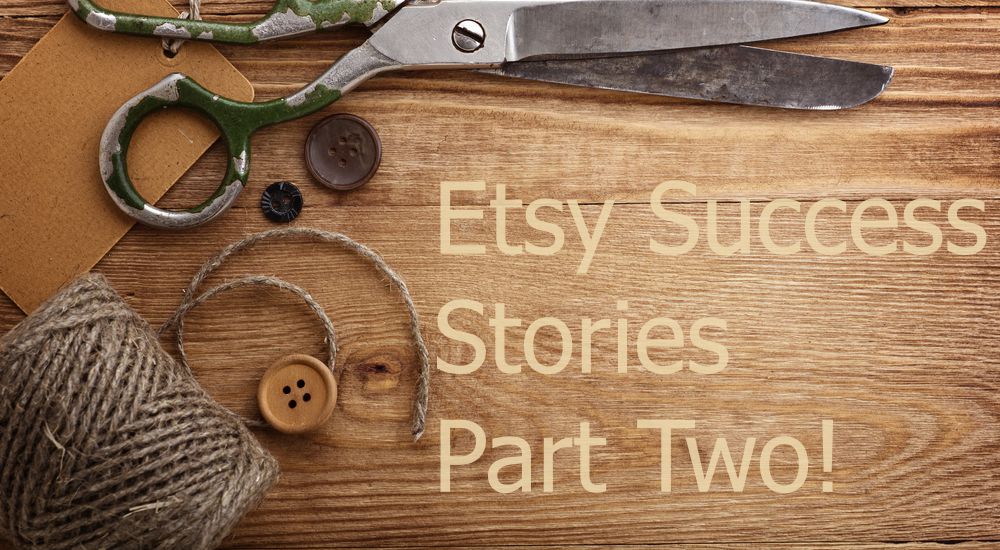
In the internet age, there's no better way to get the word out about your handmade goods than with an online shop, and if you don't have the time, resources, or inclination to set up and manage your own website, marketplaces like Etsy are a great way to go. For minimal fees, you can put your goods in front of the thousands of customers who visit Etsy every day, giving you access to a world-wide audience that live craft shows just can't match. Of course, success isn't guaranteed, but with a bit of work and a few tips from the pros, Etsy can give your sales a serious lift. Check out these ten artists who've made it big on Etsy!
1. Everfitte
Started by two friends in San Clemente, California, Everfitte combined Amanda's marketing and business know-how with Rachel's experience in clothing design to create a line of screen-printed apparel with a focus on fitness. From comfy tanks to cozy hoodies, they offer a wide range of styles and designs to appeal to a broad audience—and encourage repeat customers!
2. Designed By Lei
Leilei Secor first started selling her handmade jewelry on Etsy as a way to help pay her college tuition—where she was studying business, of course. For her, the trick to success was constantly learning and adapting. When her first jewelry styles didn't sell well, she adapted to meet customers' needs. Finding the right social media platforms to promote her work also took some experimentation; since photos of her jewelry are what makes the sale, highly visual platforms like Instagram worked well, while Facebook's pay-to-play approach didn't provide the same reach.
3. Urban Wood Goods
For Erin True, Etsy success was a bit of a happy accident. After getting married and relocating, she wasn't able to find a new job as an art teacher, and, looking for something creative to fill her time, built a bench out of reclaimed wood. Out of curiosity, Erin put together an Etsy shop and posted the bench to see if other people might be interested in her work. It turns out they definitely were! The uniqueness of her wares let her stand out from other furniture makers or upcycled crafts and continues to attract new customers.
4. Sweet Kawaii Design
An obsession with planners and all things adorable led Tesia to create her own line of kawaii (which means "cute" in Japanese) embellishment stickers and datebooks. She offers a wide range of DIY planner kits, as well as stickers for every occasion and style sensibility imaginable, plus subscriptions to keep the cuteness coming. For her, the key to success is low cost and high volume: Though each item is inexpensive to customers, they keep coming back for more!
5. Spexton
For Nate McPherson and Greg Shelton, it took a second look before they found the value of Etsy for their business. They create unique wedding bands for men, and though they had retail experience, selling online was something new. They created an Etsy store early on, but it remained dormant while they focused on selling the rings in their own brick-and-mortar store. When they finally circled back to Etsy, however, their sales figures skyrocketed. For their high-end product, the internet was the perfect way to tap into an audience that they simply couldn't reach with a small shopfront.
6. Posh Peanut Kids
Fiona Sahaki's line of adorable kids' wear started as a hobby that became a full time job and then a company with multiple employees. Her success came as a result of tapping into an audience that she knew very well from personal experience: parents! She designs and creates children's clothing and accessories that are practical and playful, fun and fancy, and offering a little bit for everyone keeps customers coming back for more.
7. Scribble Prints Co.
Scribble Prints is another shop that has tapped into the need to organize and personalize. With inexpensive and attractive stickers to create custom planners, shop-owner Andrea can generate a relatively passive income—since stickers can be mass-produced once they're designed, she can focus on new offerings to keep customers returning rather than creating each item for customers individually. This keeps costs down and encourages multiple purchases.
8. Emily McDowell Studio
Emily McDowell was a successful advertising art director, but when she found her work wasn't as fulfilling as she'd like, she struck out on her own, drawing on her love of lettering, nature, geometric shapes, and the general quirks of human existence to create cards, posters, mugs, and other products featuring her artwork. Her work has almost universal appeal—in fact, it's so popular that she has to spend time each week reporting copycat products in other Etsy shops to protect her brand. Since Etsy was instrumental in introducing her work to a large audience, it's important to maintain that brand integrity, so even though idea-poaching is rife on Etsy, it's a battle worth fighting.
9. Zoey's Attic
Zoey's Attic is the brainchild of former graphic designer Erin Delanty, who started the business after her first child was born and she found herself frustrated by a serious lack of unique children's clothes on the market. Her goal was to be very customer centered, creating products that were popular and quick sellers. Doing this allowed her to scale the business as it grew, which meant that by the time she needed to add employees to meet the demand, she also had the capital to allow her to do so.
10. Distinctly Ivy
For Ivy Presho, Etsy provided both the inspiration for her product, and the outlet for reaching her customers. Though stamped metal jewelry and accessories are fairly easy to find on Etsy, Ivy sets her work apart by guaranteeing that custom orders ship in one business day. This simple step gives her an edge over her competitors, and by consistently meeting that guarantee, she's also earned tens of thousands of five-star reviews.
Though setting up an Etsy store is not a guarantee of success, it may be a step in the right direction for your handmade business. Going into the process with a plan, a brand, and the ability to learn as you go (and from the successes and failures of others) will give you the best chance of creating a viable online business. As these Etsy pros have shown, there are many factors that go into creating that business, but there's no single recipe for success. Your handmade products could easily be the next big thing, and Etsy could be just the platform you need to reach that goal.
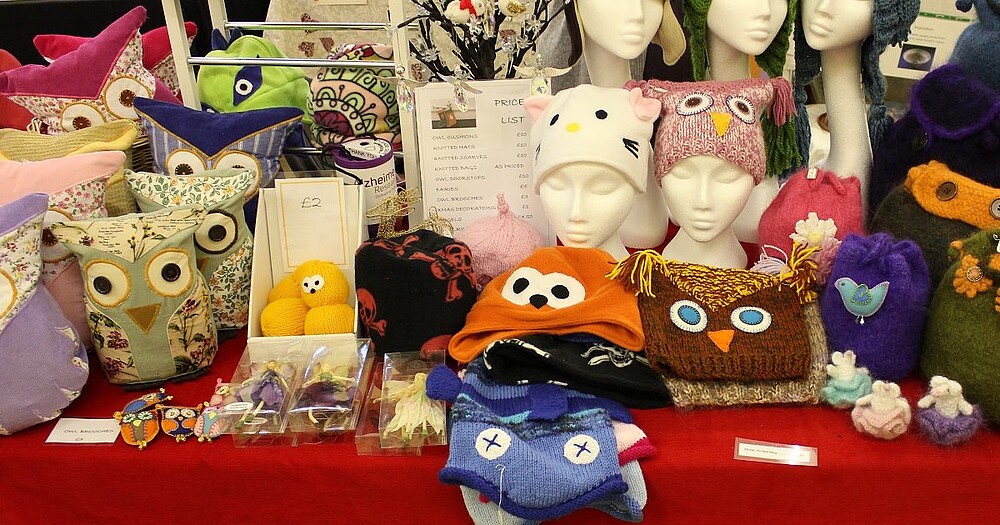
Ah, Etsy. We've all gone down the rabbit hole of surfing through pages of beautiful handmade products, admiring the skills and ingenuity of creators all over the world. It's astounding just how much variety there is on the site. There really is something for everyone. And of course, that's what makes Etsy so powerful. With so many people browsing, it's a great way to get attention for your own handmade goods, and it's so easy to get started! You don't need to know anything about designing a website or handling the complexities of ecommerce, but if you really want to turn your business into a profitable endeavor, you'll need to do more than just click a few buttons. Get the inside scoop from some more of Etsy's top artists and makers who've used the platform to make it big.
11. Bookishly
UK based artist Louise Verity was making literary gifts for sale on Etsy—cute, blocky frames featuring vintage book pages and quotes—and was enjoying a modest success while working a regular nine-to-five job in HR. When she went on maternity leave from that job, she decided to use the time to really see what her handmade business could do. As it turns out, a lot! She never went back to her HR job, focusing instead on growing a business that now employs more than a dozen people. One of the biggest keys was tapping into an existing family business to provide the framing for her works—rather than purchasing the equipment and materials to do it herself, outsourcing gave her the freedom to focus on her own artwork without worrying about compromising on quality. It's also improved the reach of her family's business—the frames proved so popular they now offer them wholesale to other makers.
12. Island Picnic
Sustainable, eco-friendly living might be chic and trendy for some, but for Leah Loudermilk, it was very nearly a matter of life or death. Her daughter was diagnosed with life-threatening food allergies, and to avoid exposing her to chemicals that could make her reactions worse, Leah opted to clean house—literally! She switched from chemical cleaning products to natural ones, went from synthetic fibers in linens and drapes to all organic cotton, and eliminated plastics wherever possible. When her friends noticed the eco-friendly items Leah was making with the help of her mother, Leah realized there could be a real market for the products. Together with her mother, the two started Island Picnic, an Etsy shop that boasts a modest annual profit of around $7,000, which, so far, she has reinvested in the business. It's not an industry for those without a little capital to invest, as Leah notes she and her mother fronted the money for all their pricey organic cotton initially, but with so many turning to a greener lifestyle, it's an investment that's paying off.
13. Shovava
Roza Khamitova, the artist behind the Etsy store Shovava, creates scarves and shawls that are truly wearable works of art. Many feature winged designs that make the wearer look like they could take flight at any moment. Her top tips for Etsy success? Focus on great photography, and always protect your intellectual property! Registering her designs made it easy to have the law on her side when her designs were stolen and sold by counterfeiters. Knowing that her work was secure allowed Roza to branch out into more types of clothing—from her original scarves, she now makes headwraps, t-shirts, and even swimwear, all featuring her designs.
14. Swanky Crafts
For Janice Worsley, the key to her Etsy shop success was tapping into the right market. She'd been making cards and gift items, but after deciding she wanted to turn her side hustle into a full time job, she knew she needed to move upmarket into more expensive items. Jewelry seemed like a good option, but after making the change, she still wasn't seeing the level of sales she needed to make the business viable...until she got engaged and realized her gifts would be perfect for bridesmaids. Swanky Crafts signature bridesmaid's bracelet was born, and sales grew by more than 500%! The business now has an additional employee just to manage the bracelets and administrative work.
15. Lucie0ellen
Lucie Ellen had already been making wooden jewelry and housewares for years when she opened her own Etsy shop. She'd been working a makers' faire booth on weekends, but the exposure Etsy offered helped get her work into additional shops and galleries. She says one of the biggest factors in her success has been hard work, pure and simple, and not stopping to compare her success (or lack thereof) with other makers. Most days, she puts in at least 10 hours, and she's still doing most of the work herself, from creating the individual elements in her jewelry, to responding to orders and emails, to packing up and shipping out finished projects.
16. JuJuJust
With quirky fiber art pieces, JuJuJust is the brainchild of artist Judit Just, who combines vintage threads and yarns and bold modern color palettes into made-to-order tapestries. She learned some of her techniques, like traditional weaving, from her mother at a young age, but spent years building up techniques and an aesthetic all her own. Part of her success, she feels, comes from good, responsive customer service. She tries to follow up with as many of her customers as possible, and has even been known to send work-in-progress photos for projects that take a little extra time.
17. Maria Allen Boutique
Maria Fox started out in the handmade business as a teenager, making greeting cards that were sold in local shops. Around the time she started university, she took that DIY attitude to jewelry—unable to find things she liked, she started making her own. Her friends were big fans of her work, and she decided to expand to Etsy. The growth wasn't instantaneous, but it certainly didn't take long before the business outgrew her parents' kitchen, where it had started. Today, Maria's business employs eight people, with more on part-time to help at the holiday rush. Etsy is only one of her sales avenues, but she notes that it gave consistently rapid growth and offered some of the best tools for analyzing the impact of her marketing efforts.
18. Four Letter Word Cards
"Colorful words to say you care" is the slogan for Michelle Baine's Etsy shop, Four Letter Word Cards. It's a perfect double entendre for the aesthetic of her handmade goods—from irreverent greeting cards that might make a sailor blush to adorable enamel pins featuring dogs wearing flower crowns. The ideas for her work come from the things she loves, including bright colors, an off-beat sense of humor, and celebrating the differences that make people unique. She's a big supporter if the LGBTQ+ community, and her work often features representation of that community that's harder to find in more mainstream greeting cards.
19. Darkhorse Gifts
Sometimes, the key to getting out of the nine-to-five grind is a laser. No, not the mad scientist, take over the world, death ray kind of laser, but a laser engraving tool, like the one that the Darkhorse Gifts team uses to customize a whole range of products in both wood and leather. Though there's a little something for everyone in their shop, one of their primary focuses is on creating items for weddings. From guitar picks as groomsmen's gifts to monogrammed ring boxes to cake toppers, there's a whole range of products geared toward the bridal industry. In fact, one of their bestsellers is their personalized wooden gown hangers, which are sold as keepsakes for the bride and her bridesmaids. This is the product that owners Aydon and Kirk credit with allowing them to finally leave their nine-to-five jobs and focus full time on their handmade business.
20. Kiriki
So often Etsy stores are born when creative people can't find just what they're looking for, and decide just to make it themselves. Of course, that means that they've stumbled across an untapped market, as Michelle Galletta did when trying to find a pattern for an embroidered doll that she wanted to make as a gift. Nothing seemed quite right, so she created a pattern for herself. Before she knew it, she was assembling kits for all levels of embroiderers and offering them up for sale in her new Etsy shop. Michelle recommends staying cohesive when adding products to your shop—she says it was tempting to let her creativity run wild and go in lots of directions at once, but keeping her offerings limited initially helped her make sure that what she was adding to her store was the right fit for her new brand.
Of course, not every Etsy store becomes an overnight sensation. For every success story, there are many more that never turn a profit. One of the great things about the internet, though, is that it's leveled the playing field for small businesses. It's no longer a matter of simply the biggest marketing budgets winning out. If your handmade goods are special, and you're savvy at marketing them, you're already on track to finding your own shop on our next success stories listing!
Is it worth selling on Etsy?
Etsy is the popular e-commerce platform for handmade products. Anyone who has ever thought about selling their own products on the internet has probably come across it. But is it worth selling on Etsy? Does it really make selling that much easier?
Deciding what steps to take to start an online business is quite a challenge. Etsy can help answer some of your questions as you embark on your journey. Selling on the platform is straightforward and quick. Follow the instructions and set up the perfect shop for your needs step by step. There are many design options that will help you create a unique Etsy store. Just remember that the design should reflect your products. And you will be glad to know that Etsy charges low fees!
Selling on Etsy is definitely worth it and offers you the ideal opportunity to promote your handmade products.
Etsy can be very helpful in promoting your products, especially when you are just starting out. Its focus is on offering unique handmade pieces instead of mass-produced items and it has a wide reach, no matter where you plan on selling. All of which is very appealing to potential customers looking for special items.
Once you have listed your products, it will soon become clear that selling on Etsy is well worth it. On the one hand, you will profit from customers who are looking for precisely such goods and on the other hand, of course, from the large number of potential customers. Your shop will quickly attract the attention of many Etsy users and leave a lasting impression. That’s how quick and easy it is to sell your merchandise on Etsy!

